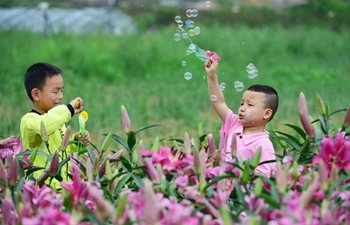SAN FRANCISCO, May 23 (Xinhua) -- Researchers at University of California, Berkeley, have found evidence of conscientiousness in insects, reptiles, birds, fish and other critters.
The researchers, in reviewing nearly 4,000 animal behavior studies, devide the conscientious characteristics in animals into two main categories: "order and Industriousness," which includes organization and cleanliness, and "achievement striving and competence," which covers mastery and deliberation.
Just as in humans, conscientiousness in animals, which includes working hard, paying attention to detail and striving to do the right thing, has such evolutionary benefits as giving them an edge in hunting and gathering, attracting mates, procreating and fending off predators, according to UC Berkeley psychologists Mikel Delgado and Frank Sulloway in the review published in the online issue of the journal Psychological Bulletin.
The researchers tracked such animal behavior attributes as industriousness, neatness, tenacity, cautiousness and self-discipline across a broad range of creatures great and small.
"Honeybees who are more likely to remove bee carcasses from their hive have more offspring, and birds who keep their nests tidier are less susceptible to being preyed on," said Delgado, a doctoral student in psychology. "Also, for many bird species, mastering song is key to mating success."
"In some bird species, females carefully inspect the display nests that are built by males," she elaborated. "Those males that build the best display nests and that have chosen nesting sites that are well hidden from predators, are more likely to be selected as mates."
Birds and insects tended to fit into the orderliness category, whereas primates and other mammals fit more squarely into the achievement striving box. This split, according to the researchers, is reflected in the "phylogenetic" family tree in which primates and other mammals branched off from birds, reptiles, invertebrates and other species as their personality traits evolved to help them adapt to differing life conditions.
"Orderly and industrious tendencies appear to have originated in insects and fish, whereas achievement striving and competence may be more closely related to problem-solving, group living, and the complexity of the environment that those animals inhabit," Delgado was quoted as saying in a news release from UC Berkeley on Tuesday.

















